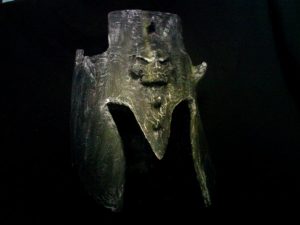 When I walked out to my back patio, I unexpectedly met resistance. My throbbing forehead had crashed against an unseen force. I stepped back to look more closely and noticed a barrier standing between me and my escape. I determined quickly that it was an invisible force field the humans have named glass. My surprise encounter caused me to consider the nature of invisibility and its place within our culture.
When I walked out to my back patio, I unexpectedly met resistance. My throbbing forehead had crashed against an unseen force. I stepped back to look more closely and noticed a barrier standing between me and my escape. I determined quickly that it was an invisible force field the humans have named glass. My surprise encounter caused me to consider the nature of invisibility and its place within our culture.
As a starting place let us examine the concept of invisibility. The word has not fallen far from its original Latin form—invisibilis. In its basic definition something is invisible when it is not perceptible by the eye. This seems the most fundamental definition that occurs to most people when they consider something to be invisible, but the dictionary pushes it even a bit further. Invisible objects may also not be discernible by the mind. Perhaps this is related to the concept of out-of-sight, out-of-mind. Used as a noun, invisible could refer to a thing or being that has the characteristics of being invisible. It could also refer to an unseen place such as a spirit world.
No matter how we define it, the concept of invisibility has slithered within our collective imaginations since the dawn of our race. Thousands of years ago myths and legends spoke of gods and heroes donning magical helms in order to pass unseen. In Greek mythology, the goddess Athena hid herself with the aidos kynee, or Cap of Invisibility, to aid Diomedes during the Trojan War. Hermes used it when he battled a giant, and Perseus used it to escape a most certain death.

Forged within magical fires by the creatures known as Cyclopes, the helmet bore many different names. To some it was simply the Cap of Invisibility; to others it was called the Cap of Hades, Helm of Darkness, Helmet of Pluto, or Helmet of Orcus. Each different name bore with it more tales of adventure and trickery. Myth claims the helm made the wearer invisible to the gods, allowing them to perform tasks unopposed and unobserved. With it they performed daring deeds they might otherwise never have attempted. Did invisibility allow them to snatch victory from defeat or hide their shameful behavior?
Even Plato wrestled with the concept of invisibility in his book Republic. The Ring of Gyges found its origins in the tomb of a giant, and legend claimed that wearing it allowed a person to become invisible. In the Socratic dialogue, Republic, the morality of invisibility swims to the surface. An argument is made that morality is a product of society. That is to say: no society, no morality. If someone were able to slip on the Ring of Gyges and move about invisibly, they would remove the yoke of society and feel free to perform immoral acts. The person would be free to do whatever they want without risking discovery and as a consequence escape any and all reprisal. I pause to consider this. I think about what I would do if I had a ring of invisibility. I put together my top ten list and have troubles finding anything that is not breaking rules or scoffing at laws. What would you do if you could become invisible?
Throughout our history we find invisibility appearing again and again. Christopher Marlowe wrote about Doctor Faustus and the devil walking about invisibly, playing pranks on the unsuspecting. Richard Wagner in his operas The Ring of the Nibelung introduced the Tarnhelm as a source of invisibility. Authors such as William Shakespeare, C.S. Lewis, J.R.R. Tolkien, and J.K. Rowling have provided their characters with some method for invisibility. The list of authors who have written about invisibility continues to grow daily; each time the method and reason shifts. We read about magical rings, cloaks, potions, spells, and helms granting invisibility.
 It was H.G. Wells who pushed the notion of invisibility from the magical to the scientific. In his novel The Invisible Man, Wells creates a scientist who discovers a method to change his refractive index so that he can pass unseen. Star Trek provides for us the cloaking device, which, curiously, is normally only used by the bad guys. While Star Trek discounts this as merely a lack of science by the Federation, it could be interpreted as a plot device or even as a veiled ethical comment. How moral could the Federation really be if it was always sneaking about unseen to attack its enemies?
It was H.G. Wells who pushed the notion of invisibility from the magical to the scientific. In his novel The Invisible Man, Wells creates a scientist who discovers a method to change his refractive index so that he can pass unseen. Star Trek provides for us the cloaking device, which, curiously, is normally only used by the bad guys. While Star Trek discounts this as merely a lack of science by the Federation, it could be interpreted as a plot device or even as a veiled ethical comment. How moral could the Federation really be if it was always sneaking about unseen to attack its enemies?
Even today’s scientists cannot escape the lure of invisibility. In March 2013, researchers at the University of Texas announced the creation of an invisibility cloak. With their ultrathin material, they were able to hide a cylinder from microwave detection. Wait, that’s nothing like Harry Potter’s cloak. Well, no it is not, but it is a step along the road. You see, light travels in waves. You might have seen water crashing on the beach. Sometimes it comes in short little waves that ripple onto the sand every few seconds. Other times the waves are great massive things that lumber towards the coast slowly before smashing apart.
Light waves are very similar. They come in all sizes and frequencies. The distance between each wave determines the label we put on it. Microwaves happen to be very long and slow like good surfing waves. A microwave can measure up to one meter in length. Visible light on the other hand is like the small fast waves that ripple onto shore or make circles in a pond when you throw in a stone. Visible light has such small waves they are measured in nanometers.
When light strikes an object, it is normally absorbed or reflected. Your black shirt absorbs light, and the white snow reflects light. This scientific cloak of invisibility does neither. Instead of absorbing light or reflecting light, it essentially flattens the wave as it strikes the cloak. If there are no ripples or waves, there is no light transmission. For now it can only do this with microwaves. The long slow waves make it easier to achieve. We can imagine that as the science continues to mature, they will be able to hide from shorter and shorter waves. Eventually they could possibly hide from all light waves, becoming in essence invisible. Is it possible that in 200 years we will be bidding on used invisibility cloaks on EBay? What happens when everyone can become invisible? Will we all just constantly walk around hidden from each other? How will society survive? If we look at our top ten list of things to do while invisible, will we all be breaking the law?
My mind turns back to Socrates and his debate on the subject. One side argues that given the ability to become invisible, all humans will resort to immoral behavior. Socrates argues that those with good inside will put the ring of invisibility down and hold to their moral compass. As the debate swirls in my head, I gaze around for some evidence that might support one side of the argument. My eyes fall upon the internet.
In a way the internet is a cloak of invisibility. It allows us to pursue those story lines dreamed of for thousands of years. With the internet we can move unseen throughout the world. We can watch without being watched through webcams and YouTube videos. We can take things that don’t belong to us through file sharing sites and hacking software. Through the internet we can act and behave however we want without fear of reprisal. Men can claim to be women and date football players remotely. We can point fingers and throw stones hidden behind our avatars and made up names, safe in the knowledge that society will never know. Socrates was right, though. I can see that now. Not all choose to slip on the Ring of Gyges. A balance is struck between the moral and the immoral.
As I sit behind my keyboard of invisibility, I think about those other definitions. Those nouns keep poking at me. They whisper of unseen places beyond my detection. I laugh at the idea. How stupid. How silly. How could there be invisible worlds? Then the scientific method punches me in the face. Scientists have “proved” that the unseen does exist. They speak of Dark Matter and Dark Energy. They tell me that most of the universe is made of matter and energy that we humans have no method to detect. They claim that they know of its existence from the influences it has on the visible world. I trust them. I believe them. Dark matter does exist. If science has shown us that there is an invisible world, how far then is it to the next definition of this noun? Could there really be invisible beings, creatures that live outside of our detection? “How stupid. How silly,” I whisper to myself. I look towards the scientists and wonder what they will prove next.











Recent Comments